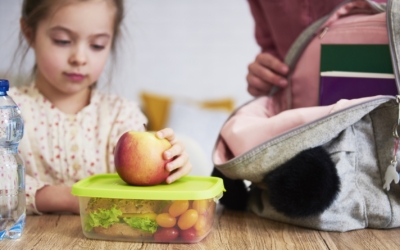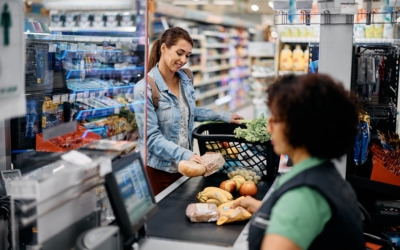Updated on: January 24th, 2024
Since I Can for Kids (iCAN) launched in 2015, we’ve witnessed a dramatic increase in the levels of distress among the food-insecure households we serve. A greater number of parents and children now endure the unrelenting anxiety caused by food insecurity, material deprivation, and social isolation. More and more food-insecure families are forced to invest significant amounts of mental and physical energy to find other ways to meet all their basic needs, especially food.
The results of our most recent program evaluation indicate that many of our recipients struggle to maintain psychological resilience. Our agency partners estimate that:
- 30% of the families who access our grocery gift card program are raising a child with a mental health issue
- 43% of the parents who access grocery gift cards struggle with poor psychological health
- 1 in 4 of our recipients lives in a household that experiences domestic violence
- the most common reason that parents need support is the inability to maintain regular employment due to a mental health issue
However, with your ongoing support, we can all continue to boost the emotional well-being of food-insecure kids and families so they can focus on leading a creative and productive life rather than worrying about their next meal.
What’s the link between food insecurity and mental health?
Although most people equate food insecurity with hunger, few realize that this complex issue is strongly linked to devastating effects on mental health. The adverse impact of food insecurity leads to a progressive deterioration of children’s psychological well-being as they mature. Even though parents try to shield their kids from money problems and food insecurity, children still become very aware when their families face financial stress and limited food supplies. As a result, youngsters try to lower household anxiety by cutting back on their own intake so everyone in their home can have something to eat. Research shows that:
- early life adversity is linked to a wide range of life struggles, including poverty, food insecurity, and mental illness
- youth living in severely food-insecure homes are more than two and a half times more likely to report poor mental health, mood disorders, anxiety disorders, and major depression
- food-insecure kids access mental health services up to 75% more often
In addition, experts highlight a strong link between growing up with childhood food insecurity and facing a magnified risk of:
- vulnerability to negative mental health outcomes
- major depression and suicidal ideation
- emotional distress and mood or anxiety disorders
- feeling ashamed, embarrassed, and inferior
- experiencing powerlessness and stigma
How do grocery gift cards help?
The key reason iCAN transitioned to a grocery gift card approach was to enhance dignity, choice, and resilience among the food-insecure households we serve. Over the past few years, exaggerated levels of global stress, conflict, and economic uncertainty have taken a major toll on the mental well-being and financial security of many families. In addition, Alberta continues to have the highest proportion of households who experience severe food insecurity across all ten provinces.
But we have good news! According to our agency partners, food-insecure parents always mention numerous psychological benefits when accessing our grocery gift card program, such as:
- increased ability to pay bills for basic needs
- reduced emotional distress
- enhanced sense of personal competence
- stronger feelings of dignity
- more trust towards the agency partners
These advantages are also reflected in our research results. Study participants experienced much less financial stress, greater confidence, and decreased anxiety with access to grocery gift cards compared to free food hampers. The most encouraging finding is that our approach bolsters the mental health of everyone living in the same household. This is important because another study in Canada estimates that we could reduce the level of serious mental health issues among adults by 8% to 16% if we eliminated the experience of severe food insecurity through income-based supports.
Just last month, a mother contacted us to share her immense emotional relief: “It’s a difficult time for our family. Everything is difficult: paying bills, buying food, worrying for my kids’ education and for our health. What you are doing is unforgettable. You put a smile on my kids’ faces. There are no words to describe the way I feel at this time. But my kids’ smiles are worth a million dollars.”
To join iCAN’s expanding list of donors, sponsors, and champions, check out the different ways you can get involved or donate.
To learn more about I Can for Kids and their unique approach to childhood food insecurity, visit www.icanforkids.ca
About Donald Barker
Donald Barker has worked as a registered dietitian for more than 25 years. He also has a professional background in communications and has long advocated for populations who face adverse, unjust, or systemic barriers that lead to higher rates of poor social, mental, emotional, and physical health outcomes. Donald currently volunteers as an Advisor with iCAN to support our transition towards evidence-based approaches that help improve the well-being of children in Calgary who live in low-income and food-insecure households.
About I Can for Kids Foundation
I Can for Kids works closely with multiple agency partners to target and distribute grocery gift cards to food-insecure families who are most in need. The iCAN grocery gift card program is a more dignified and inclusive approach to dealing with food insecurity, allowing families to shop where everyone else shops and to choose foods that are appropriate for their health and cultural needs. Last year, iCAN supported more than 34,000 children across Calgary.
For more information and media inquiries, please contact iCAN Executive Director, Bobbi Turko at bobbi@icanforkids.ca.




